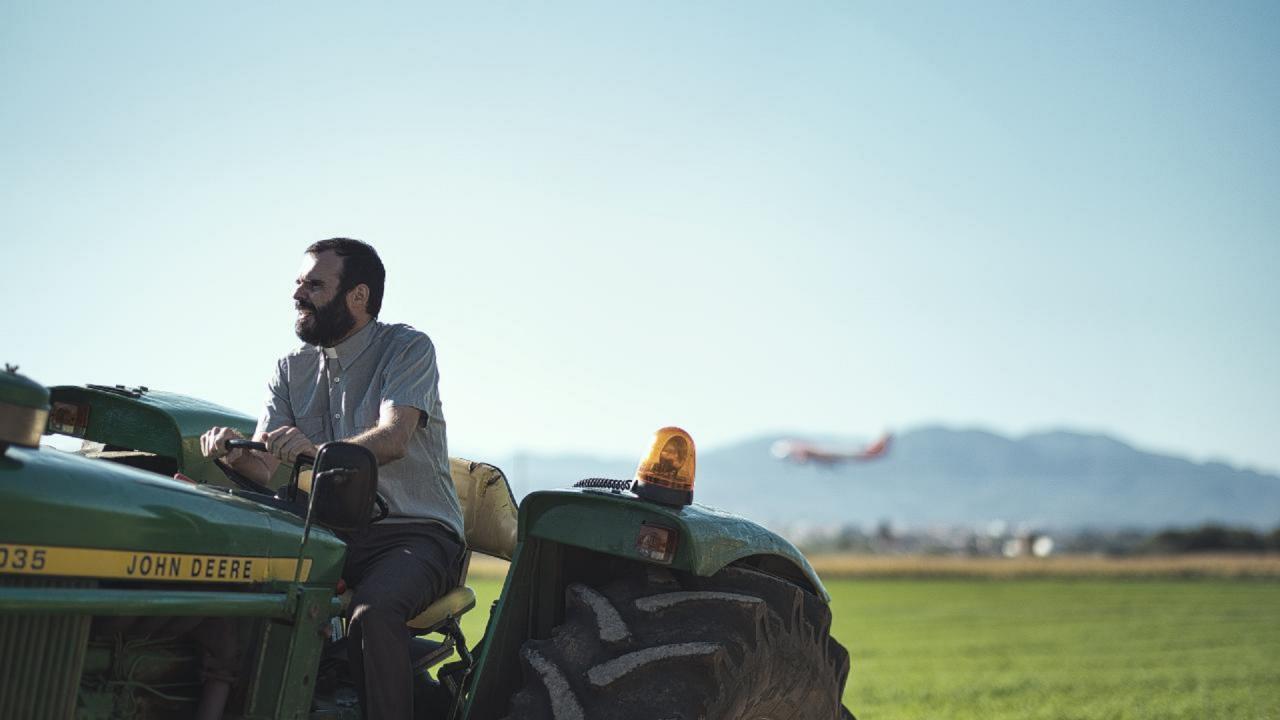Coldplay are an infuriating band. As soon as I see paradise mentioned, I hear Chris Martin. I wish he’d stop. Mind you, it could be worse. Phil Collins, for example.
It was ‘Paradis’ that did it. Not Vanessa, but the title of a theatrical performance to be staged across Mallorca and which debuted in Palma last weekend. Described as being a kind of road movie, there’s no place for Vanessa’s ‘Joe le taxi’ on the road. A promotional image shows the actor Sergio Baos on a tractor.
This is off-road Mallorca, but a plane landing in the background of the image may offer a clue as to what ‘Paradis’ is about. Or does it?
One review of this production was headlined “surviving in a non-tourist Mallorca”. The paradise title, the juxtaposition of tractor (foreground) and plane (background), and the headline thus intimated that the production is in the general territory occupied by some other recent creations, such as the film documentary ‘Overbooking’. This is paradise being rediscovered, it having been lost to the jet plane.
Consequently, to be on the road in Mallorca is to be condemned to the jams on the Formentor peninsula (before they sought to eliminate them) or to the “collapse” of Palma on summer days when the clouds roll in and tourist cars block every available road in the city plus several which aren’t, and the town hall’s SMAP car park operator has a bonanza. A road movie can surely mean only one thing - saturation - and a hankering for the past.
When the seafront road in Palma is chocka, the statue of Nuredduna staring out to sea near the Palacio de Congresos isn’t pining for her lost Greek sailor, she wishes to return to the Arta of 1900 when Miquel Costa i Llobera wrote the epic poem. A return to paradise, to the aftermath of the vineyard devastation caused by phylloxera, to the emigration, to the grinding rural poverty, to the contraband and formative years of the empire of Joan March, Mallorca’s most dishonourable son. But it was also the 1900 of artist Santiago Rusiñol and his contemporaries who came to Mallorca. They painted paradise; it was to be decades before they put a parking lot.
You might think that ‘Paradis’ is an exercise in longing for the days before tourism became king, that it resonates with the words said to Robert Graves by Gertrude Stein in 1929 - “Mallorca is paradise, if you can stand it”. But it isn’t. While Mallorca is a paradise of an island, not everyone can enjoy the pleasures. There are those who live in Mallorca who don’t have this paradise at their fingertips.
It is about surviving in a non-tourist Mallorca because the road movie style production deals with a Mallorca that is removed from the postcard images and Instagram. The protagonists are those in the dole and food bank queues, who are forced into a world of the “picaresque” - roguish, dishonest - in order to survive.
In summer 2013, the German magazine ‘Stern’ caused a considerable stir. For a nation of holidaymakers who speak of the “Paradies-Insel”, the front cover of the edition which came out in July read: “Mallorca, the dark side of the holiday island”.
Under the heading “the Mallorcan brand”, the leader said that “behind the facade is a great mass of misery, criminality and despair”. Among its images was one of a queue for a soup kitchen.
‘Paradis’, although it is said to take something of a comedic tone, doesn’t seem to be so far away from what ‘Stern’ revealed. In one respect, there is a similarity in circumstances, those of crises, but regardless of these crises and their differing natures, there were and are the underlying truths. The pandemic exacerbates these, and it threatens the vulnerable and those for whom the future seems to be disappearing.
There was a report the other day about the impact on the young in Mallorca. Fatigued and suffering from anxiety, there is a feeling that there is no future. The enjoyment of paradise and the benefits of tourism (work in particular) are being denied. And in this regard, there is the echo of another Mallorcan production, Toni Bestard’s film ‘Pullman’.
It was made before the pandemic, but Bestard has since said that it is a story of initiation towards an uncertain future because of the economic crisis that looms over us, especially in the tourism sector. The Pullman apartments exist. They are in Cala Major. Many of the people who live there experience a non-tourist Mallorca despite working in tourism. The two kids of the film, Bestard has explained, “enter the back room of paradise”. They glimpse it, but it is with all that uncertainty.
Paradise, Mallorca. They are synonyms, yet there are those for whom Gertrude Stein’s famous words can be altered: Mallorca is paradise, if you can find it.


No comments
To be able to write a comment, you have to be registered and logged in
Currently there are no comments.